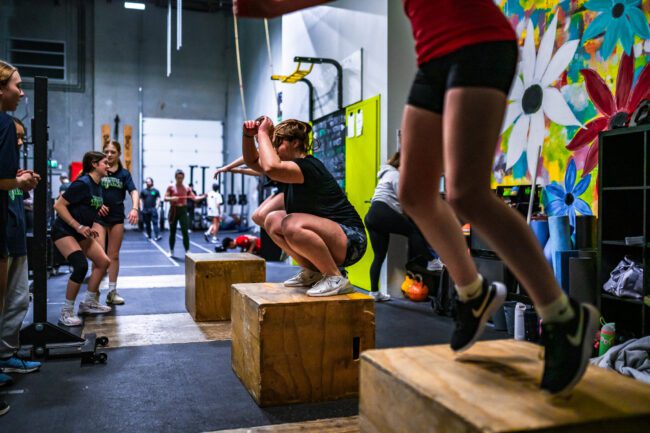Athlete Development Programs →
Training Well-Rounded Athletes
Our Athletic Development Program is geared towards athletes that are looking to advance their sport of choice through dedicated strength and conditioning programming. The focus is to create well balanced athletes that exude power and confidence while mitigating any imbalances that occur as a result of sports performance training.
Our approach creates athletes that have great success and longevity within their sport of choice!

Elevate Your Game with Sports Performance Training
Our Athletic Development Program is designed to help athletes excel in their sport through personalized strength and conditioning programming. Each athlete begins with a comprehensive consultation to assess their unique needs and identify areas for improvement tailored to their sport-specific demands.
Our focus is on developing well-rounded athletes who exhibit power, confidence, and resilience while addressing any imbalances that may arise from repetitive sports activities. This holistic approach enhances performance, reduces injury risk, and promotes longevity in your athletic career.
Sessions are tailored to your schedule and goals, ensuring you get the most out of every training session.
Ready to take your performance to the next level? Book a consultation today!
Our Client Achievements
Athletic Development Program Athlete Luca place 3rd in her most recent figure skating competition! She is currently ranked 7th in Western Canada.
Athletes Matthew Tennant and Ronnie Mundell winning First Place in the Novice division at the 2018 Festivus Games for Team “Brothers from other Mothers”. Both athletes have also competed in the Individual Teen Finals at CanWest in 2017 and 2018.
Our team
Meet the experts behind your success
Weightlifting, Powerlifting, Sport Specific Strength and Conditioning
Testimonials:
I’ve been training with Devin for over three years now and I have learned so much! I’ve also lost 30 lbs and gained confidence in weightlifting. I never imagined that I would crave working out. Devin’s coaching keeps me motivated, focused and accountable in a way that I just can’t do on my own. - AJ
Strength and Conditioning, Gymnastics, Active Rehabilitation
Testimonials:
Jeremy has been an amazing coach throughout the 3 years I’ve been attending his classes. He explains movement standards clearly, provides helpful cues to improve form and technique in all areas, and has helped me learn to pace myself better in metcons. — Fabiola M.
Neuro Performance Coach & Kinesiologist
Testimonials:
I’ve never been super fit, and after only a few months my body was capable of things that it never had been before. I started in the gym to cross-train for paddling; and with his help, I feel faster, stronger, and have better balance. I experience new gains every week, on and off the water, and it keeps me motivated to do more.
CrossFit, Hyrox, Strength Training, Injury Prevention
Testimonials:
I’ve been working with Joyce for just under a year now, and I could not be happier! I came to her having no idea what I was doing in the gym, but she’s an amazing coach and has made me feel confident and safe in the gym. I’m in the best shape of my life now that I’m working with Joyce, and have come to really love my gym sessions!” - Loni P.
Olympic Lifting, Lifestyle Coaching
Favourite Exercise:
Anything with a barbell!
Favourite Food:
Bag-O-Chicken....and green tea!
Favourite Activity Outside the Gym:
Getting into nature, ballroom dancing
Fun Fact:
I was a competitive figure skater for 14 yrs
Olympic Lifting, Sport Specific Strength and Conditioning, Technical Analysis
Testimonials:
I’ve chosen the team at FHC because of the vast education each coach has, and shares with its members. Lately I’ve worked with coach Matt in achieving a personal best in Olympic lifting. Not only was I able to crush my goals in 6 sessions, he continued to check in with how I was feeling that day/ week, and kept the workload realistic. - Jenn M.